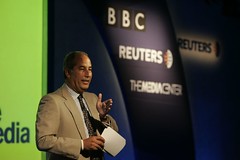Tom Glocer, CEO of Reuters talks during the session “Big Idea 4: The Democratization of Media – Where does trust fit in?” at Day 2 of the We Media Global Forum. Photo by Paul Hackett, Reuters
Highlights from Tom’s talk:
The growth of participatory media is in inverse proportion to citizens’ participation in democracy. There has been a huge drop in the percentage of people who take the time to vote in elections; in the USA the voting percentage was 69% n 1975; today it is 55%. So why are voting numbers declining in the western democracies?
It’s not because people are apathetic. Maybe it’s because people feel that their voices are not being heard by politicians through voting; blogging is their way of making their voices heard. Of participating. That has some pretty scary implications for the future of democracy.
Some of those themes came up in the trust poll the BBC did before the conference. Trust in media inthe developing world is highest; but in the UK, US and Germany, the population sample trusts government more than the media.
In other words, people of the western media do not seem to feel that they are part of the democratic process.
With so many sources out there, and such a vibrant dialogue going on, who do you trust? What is the role of the more traditional media companies? Used an example of a photo sent in by a citizen, purportedly of deer in front of a forest fire in Dorset. The Reuters staff were able to fact check carefully, and concluded that the photo came from Cass Sunstein’s bok “Laws of Fear.” Photo was taken in Yellowstone, and “deer” are elk. Point is, Reuters has money and staff to do careful fact checking, but who fact checks bloggers?
On the other hand, it can’t be true that only professional journalism is the answer. Participatory journalism can be amazing – great content. The important thing is to find a balance between participatory and professional journalism. For example, citizen journalists can send us photos and we can fact check them.
It’s up to all of us to strike a balance between incorporating outside content an dcreating inside content to get our own message across and encourage people to contribute because they appreciate our values. We do not want to give the message that we have a monopoly on truth. It’s not an “either-or” choice. It’s a complex choice.
Our interaction with GVO is about how to bring GVO into the Reuters environment and make it richer for everyone.
My observation: Tom seems to be participating a complementary view of MSM and citizen journalists/bloggers. Let Reuters report the facts, and let the bloggers debate the issues raised in the Reuters report and add nuance. This is actually a much more conciliatory MSM approach than that which was on display during the first day of the conference.
TAG: wemedia

this is really about a later session but nowhere to link to yet.
Re OhmyNews. there is a proposal for a version in Japan, working with Softbank
http://english.ohmynews.com/articleview/article_view.asp?at_code=314174&no=277280&rel_no=1